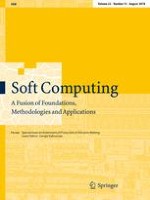21.05.2018 | Focus
Multi-objective evolutionary algorithm for tuning the Type-2 inference engine on classification task
Erschienen in: Soft Computing | Ausgabe 15/2018
EinloggenAktivieren Sie unsere intelligente Suche, um passende Fachinhalte oder Patente zu finden.
Wählen Sie Textabschnitte aus um mit Künstlicher Intelligenz passenden Patente zu finden. powered by
Markieren Sie Textabschnitte, um KI-gestützt weitere passende Inhalte zu finden. powered by
